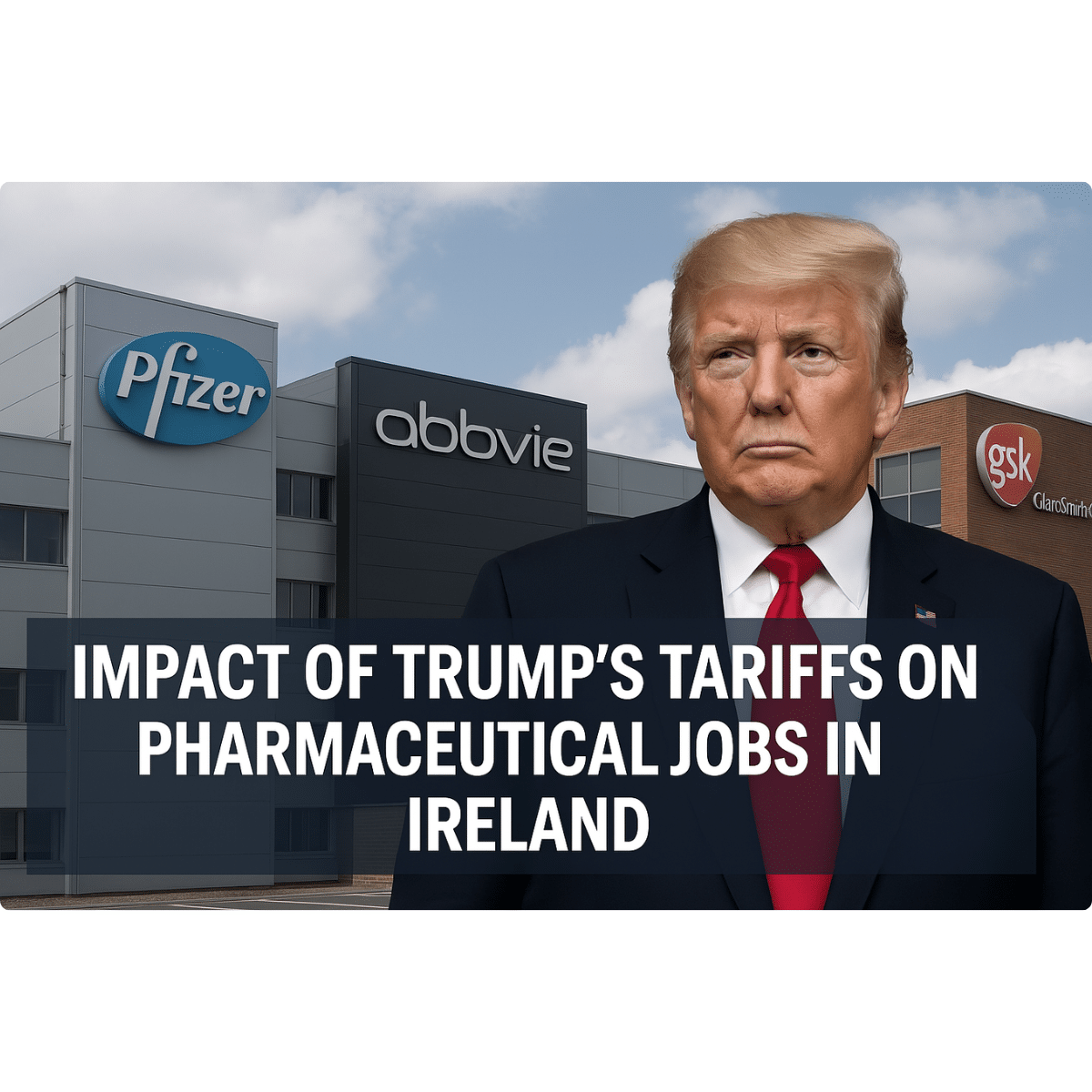The recent announcement of new tariffs by former President Donald Trump has the potential to disrupt global trade, particularly in the pharmaceutical industry. As a hub for multinational pharma giants like Pfizer, AbbVie, and Merck, Ireland plays a pivotal role in the global supply chain. However, these changes could lead to higher production costs, supply chain disruptions, and even redundancies within the sector. For employees in the pharma industry, particularly those at risk of redundancy, understanding the financial options available—including pension unlocking—is critical to securing a stable future during these uncertain times.
Pharmaceutical Companies in Ireland
Ireland is home to numerous global pharmaceutical companies, with large-scale operations across the country. As multinational pharma companies adjust to the economic impact of new tariffs, employees may face uncertainty, especially if their company must restructure or cut costs. Below are some of the largest pharmaceutical companies operating in Ireland and the locations where they have significant facilities:
1. Pfizer
-
Location(s): Ringaskiddy (County Cork), Drogheda (County Louth), Dundalk (County Louth)
-
Sector: Drug Manufacturing, Biologics
-
Potential Impact: With tariffs raising raw material costs, Pfizer’s operations may experience price hikes and potential delays in production.
2. AbbVie
-
Location(s): Sligo, Dublin
-
Sector: Biopharmaceuticals, Immunology, Oncology
-
Potential Impact: AbbVie’s biologics and immunology drugs could face production delays due to tariff-related disruptions in sourcing key ingredients.
3. Merck (MSD)
-
Location(s): Carlow
-
Sector: Vaccines, Cancer Drugs
-
Potential Impact: The cost of importing key components for vaccines and cancer drugs could increase due to tariffs, affecting the company’s production timelines.
4. Johnson & Johnson
-
Location(s): Limerick, Tipperary, Cork
-
Sector: Medical Devices, Pharmaceuticals
-
Potential Impact: With tariffs impacting both pharmaceutical ingredients and medical device components, Johnson & Johnson may face increased costs and delays in its operations.
5. Roche
-
Location(s): Clonmel (County Tipperary), Dublin
-
Sector: Oncology, Biotech
-
Potential Impact: Roche’s biotech and oncology treatments could be delayed due to tariff-related disruptions in the supply of raw materials.
6. Sanofi
-
Location(s): Dublin, Waterford, Carlow
-
Sector: Diabetes, Cardiovascular, Vaccines
-
Potential Impact: Sanofi could see price increases and supply delays for diabetes medications and vaccines due to the tariffs on imported materials.
7. Eli Lilly
-
Location(s): Kinsale (County Cork)
-
Sector: Diabetes, Oncology
-
Potential Impact: Eli Lilly’s focus on diabetes treatments could be impacted by tariff-related supply chain disruptions.
8. GlaxoSmithKline (GSK)
-
Location(s): Dublin, Cork
-
Sector: Consumer Health, Vaccines, Respiratory Drugs
-
Potential Impact: GSK may face delays in producing vaccines and respiratory drugs due to higher costs on raw materials caused by tariffs.
9. Novartis
-
Location(s): Dublin, Cork
-
Sector: Generics, Oncology, Neuroscience
-
Potential Impact: Novartis could experience cost increases for generics and delays in oncology treatments due to tariff-related challenges in sourcing materials.
Why Tariffs Could Affect Pharmaceutical Employees in Ireland
As the pharmaceutical sector navigates the uncertainty brought on by Trump’s tariffs, employees across Ireland could face significant changes. The key sectors that may be impacted include:
-
Raw Materials and Active Pharmaceutical Ingredients (APIs): Companies like Pfizer, AbbVie, and Sanofi rely heavily on raw materials and active ingredients sourced globally. With tariff hikes, these companies may face higher manufacturing costs, leading to production delays and potential job cuts.
-
Biologics and Biotechnology: Companies like Roche and AbbVie are leaders in biologic and biotech drugs, which require specialized ingredients. Tariffs may disrupt supply chains for these critical materials, affecting drug production.
-
Vaccines and Oncology Drugs: Companies like Merck and GSK could see delays in the manufacturing of vaccines and cancer treatments, both of which rely on global supply chains for their components.
Why Tariffs Could Affect Pharmaceutical Employees in Ireland
As the pharmaceutical sector navigates the uncertainty brought on by Trump’s tariffs, employees across Ireland could face significant changes. The key sectors that may be impacted include:
-
Raw Materials and Active Pharmaceutical Ingredients (APIs): Companies like Pfizer, AbbVie, and Sanofi rely heavily on raw materials and active ingredients sourced globally. With tariff hikes, these companies may face higher manufacturing costs, leading to production delays and potential job cuts.
-
Biologics and Biotechnology: Companies like Roche and AbbVie are leaders in biologic and biotech drugs, which require specialized ingredients. Tariffs may disrupt supply chains for these critical materials, affecting drug production.
-
Vaccines and Oncology Drugs: Companies like Merck and GSK could see delays in the manufacturing of vaccines and cancer treatments, both of which rely on global supply chains for their components.
What Pharma Employees Need to Know:
For pharmaceutical professionals in Ireland, the changing landscape due to tariffs could mean uncertain times ahead. If you’re worried about redundancy or need advice on how to manage your finances during this uncertain period, Q Financial is here to help.
1. Redundancy Support:
Facing redundancy can be a daunting experience, especially if it’s tied to structural changes in the company. At Q Financial, we offer expert guidance on managing your redundancy package, providing strategies to make the most of any severance pay, and helping you plan for the next phase of your career.
2. Pension Unlocking:
If you’ve accumulated a pension during your time in the pharma sector, Q Financial specializes in pension unlocking. We help employees who have left their employers access their pension funds early, providing financial relief during uncertain times. Whether you’re looking to unlock your pension early due to redundancy or need help managing your pension options, we can guide you through the process.
3. Financial Planning for Career Change:
Transitioning from one career path to another, especially if you’re considering a move within or outside of the pharmaceutical sector, requires careful financial planning. At Q Financial.ie, we can help you assess your financial situation and create a plan that ensures your future stability during this time of change.
With Trump’s tariffs potentially shaking up the pharmaceutical sector in Ireland, employees in the industry must be prepared for any financial changes that lie ahead. Whether you’re facing redundancy, or seeking to unlock your pension to ensure financial security during this transition, Q Financial offers expert support and advice.
For a free consultation and to learn more about how we can assist you, reach out to Q Financial today. Don’t let the uncertainty surrounding tariffs and redundancies affect your financial future—let us guide you through these challenging times.
Q Financial is here to provide tailored advice and support during uncertain times. If you’re facing redundancy or need help with pension unlocking, contact us for a consultation today. Take control of your financial future with the help of the experts at Q Financial.
-







